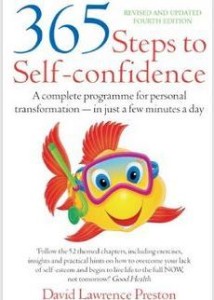Our country is suffering from an epidemic. Every day most of us come into contact with sufferers. You may even suffer from it yourself. And yet it often goes unrecognised. The condition? Acute low self-esteem and a chronic lack of self-confidence.
Yes, low self-esteem is endemic in society and it wreaks more havoc than cancer, AIDS and heart disease put together. It is behind most crime, eating disorders, drug taking, relationship and family problems. It affects our happiness and industrial performance and is largely responsible for underachievement at school. It is at the root of most stress and illness, but unfortunately is not a physical condition. If it were, the government would declare it a national emergency and get together with the pharmaceutical companies, setting aside massive funds and organising a national publicity campaign.
We all want to be happy, healthy, successful and enjoy peace of mind, but the chances of realising any of these are remote unless you feel good about yourself. Yet many people don’t particularly like themselves and feel they’re not capable of very much. Without good self-esteem, all they can hope for is a life of quiet desperation.
What’s brought about this malaise? The answer generally lies in childhood experiences. Few parents understand the importance of communicating with their children in an uplifting and encouraging way. Some don’t even understand the importance of communicating with them at all, preferring to talk into a mobile phone while walking down the street!
Many don’t appreciate that judicious praise is one of the prime means of raising a psychologically healthy child. They take it as their duty to belittle their children, pointing out their every fault and every mistake they make, often in a disparaging, insulting or even abusive way. The problem is exacerbated for some by a religious tradition that emphasises the need for redemption and frowns on positive self-regard.
As a result, by the time they start school, these unfortunate infants are already questioning their self-worth and doubting their own abilities. The average child has already been subjected to no less than 100,000 negative injunctions by the age of 12 – ‘Don’t’, ‘You can’t’, ‘Put it down’ and so on.
Once learned these negative thinking patterns remain firmly entrenched unless firm and persistent steps are taken to eliminate them for good.
In my years of full-time education and attending business training course I don’t recall a single session on self-esteem. Personal development courses focussed on team activities and inter-personal skills, with confidence as a by-product. How misguided! You wouldn’t teach someone to play a musical instrument by hoping they find the right notes by chance. Similarly, only conscious and deliberate steps can improve confidence once the need has been detected.
The exciting thing is, no matter what your background or current level of self-esteem, you can always improve. Everyone can learn how to change their thinking and feel better about themselves. Courses in self-esteem should be part of the national curriculum taught in all schools and made available for parents and teachers. What’s the point of knowing your 12 times table if you feel rotten and worthless about yourself?
If this were given priority, we could transform the prospects of our young people from the grass-roots up within a generation. Now isn’t that exciting?
©David Lawrence Preston, 28.3.2016
Follow me on Facebook and Twitter @David_L_Preston
How to Books, 2010

Leave a Reply